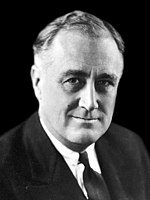| ||||||||||||||||||||||||||
| Turnout | 83.36% (of registered voters) 70.56% (of eligible voters) | |||||||||||||||||||||||||
|---|---|---|---|---|---|---|---|---|---|---|---|---|---|---|---|---|---|---|---|---|---|---|---|---|---|---|
| ||||||||||||||||||||||||||
 County Results
Roosevelt 40–50% 50–60% 60–70% 70–80%
| ||||||||||||||||||||||||||
| ||||||||||||||||||||||||||
| Elections in California |
|---|
 |
The 1936 United States presidential election in California was held on November 3, 1936, as part of the 1936 United States presidential election. State voters chose twenty-two electors, or representatives to the Electoral College, who voted for president and vice president.
California voted for the Democratic candidate, incumbent President Franklin D. Roosevelt of New York, in a landslide over the Republican challenger, Kansas Governor Alfred Mossman Landon, carrying every county and nearly sixty-seven percent of the vote to Landon’s 31.7%. Roosevelt’s percentage of the vote is the highest of any presidential candidate in California history, besting Warren G. Harding’s 66.2% in 1920.[2] While his 35.25-percentage point margin of victory over Landon is the largest for any Democratic candidate, it is the second largest overall behind Harding’s 41.92% in 1920 and ahead of his cousin Theodore Roosevelt’s 34.9% in 1904.
As of the 2024 presidential election[update], this is the last time that a presidential candidate from either political party completely swept all of California’s counties in an election. The only other candidate to manage this was Harding in his landslide 1920 victory.[2]
Roosevelt was the last Democrat until Hillary Clinton in 2016 to carry Orange County in a presidential election, and the last until John Kerry in 2004 to carry Alpine County. Also, this was the only one of FDR’s four presidential campaigns where he carried Riverside County, which had never previously voted Democratic since its first election in 1896[3] and would not do so again until Lyndon B. Johnson in 1964. It would also be the first election in the state’s history where the Democratic Party won the state in two consecutive presidential elections.
This was the last election in California where presidential electors were chosen directly by the voters. Starting in 1940, the state adopted the modern "short ballot" where voters could only choose between the actual candidates' names, with the understanding that a vote for a candidate was a vote for their party's entire slate of electors.
- ^ "Historical Voter Registration and Participation in Statewide General Elections 1910-2018" (PDF). California Secretary of State. Retrieved May 5, 2022.
- ^ a b Thomas, G. Scott; The Pursuit of the White House: A Handbook of Presidential Election Statistics and History, p. 421 ISBN 0313257957
- ^ Menendez, Albert J.; The Geography of Presidential Elections in the United States, 1868-2004, pp. 152-155 ISBN 0786422173

